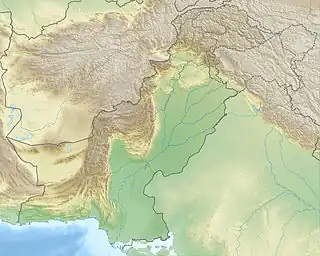| Hindu Raj Mountains | |
|---|---|
 Koyo Zom | |
| Highest point | |
| Peak | Koyo Zom |
| Elevation | 6,872 m (22,546 ft) |
| Naming | |
| Native name | سلسلہ کوہ ہندو راج (Urdu) |
| Geography | |
 | |
| State | Khyber Pakhtunkhwa, Gilgit-Baltistan (Pakistan) |
| Range coordinates | 36°19′42″N 72°59′55″E / 36.328403°N 72.998657°E |
The Hindu Raj (Urdu: ہندو راج, translation: "Hindu rule" in Sanskrit) is a mountain range in northern Pakistan, between the Hindu Kush and the Karakoram ranges.[1] Its highest peak is Koyo Zom, 6,872 m (22,546 ft).[2] Other notable peaks include Buni Zom,[note 1] Ghamubar Zom and Gul Lasht Zom. The peaks in the Hindu Raj mountains reach around 5,000 metres to 6,000 metres on average.[2]
Etymology
The name Hindu Raj (हिन्दू राज) means "Hindu rule" in Sanskrit and its descendant languages, such as Hindi-Urdu.[1] The word Hindu, used to describe the inhabitants in the land of the Sindhu (Indus) River, is ultimately derived from the Sanskrit word Sindhu (सिन्धु), which means "a large body of water";[3] the word raj means "rule" in Sanskrit.[4]
Features
The Hindu Raj mountain range runs between Chitral and Gilgit; they are located south of the Pamir Mountains and east of the Hindu Kush.[2] Its peaks rise to approximately 22,500 feet.[5] The Hindu Raj mountains run parallel to the Hindu Kush mountains.[6] Its highest peak includes Koyo Zom, which reaches 6,872 metres.[2]
Notes
- ↑ Sources disagree on whether Buni Zom is in the Hindu Raj or the Hindu Kush.
References
- 1 2 The Himalayan Journal, Volumes 34-35. Oxford University Press. 1974. p. 109.
- 1 2 3 4 Singh, Vijay P.; Singh, Pratap; Haritashya, Umesh K. (1 July 2011). Encyclopedia of Snow, Ice and Glaciers. Springer Science & Business Media. p. 514. ISBN 978-90-481-2641-5.
- ↑ Takacs, Sarolta Anna; Cline, Eric H. (17 July 2015). The Ancient World. Routledge. p. 377. ISBN 978-1-317-45839-5.
- ↑ Annals of Oriental Research, Volume 19. University of Madras. 1974. p. 7.
- ↑ Simner, Mark (20 January 2017). Pathan Rising: Jihad on the North West Frontier of India 1897-1898. Fonthill Media.
- ↑ Cavendish, Marshall (2006). World and Its Peoples. Marshall Cavendish. p. 292. ISBN 978-0-7614-7571-2.